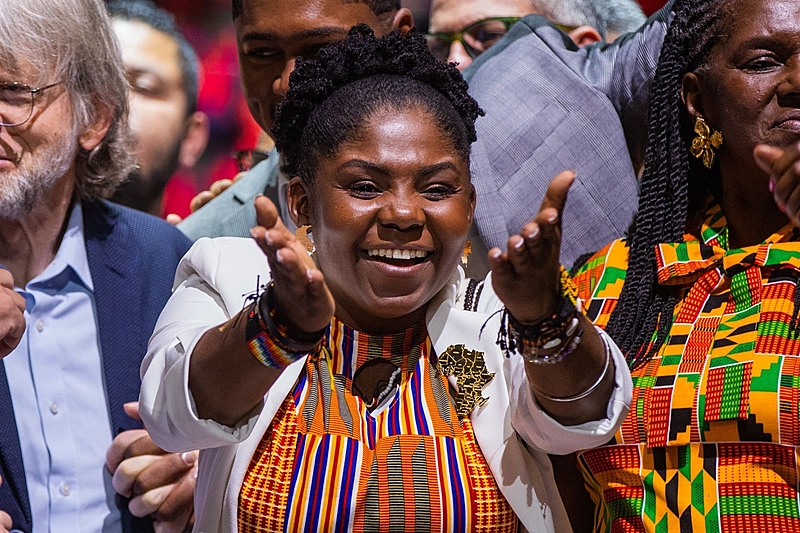RIO DE JANEIRO, BRAZIL – In his first speech after winning the elections, the president-elect of Colombia, Gustavo Petro, assured that “from today Colombia changes, Colombia is different”.
After 214 years, a leftist government came to power with the election of a vice-president who broke the mold: Francia Márquez Mina, environmental activist, Afro-descendant, feminist, and human rights lawyer.
At 40, the social leader became the second woman and the first Afro-Colombian to hold the position.

On Sunday, June 19, Marquez celebrated that Colombia would have the first “popular government and of the nobodies” in its history, “an important step to reconcile the nation”.
“This will be the government of the people, of the calloused hands, the government of the people on foot, the government of the nobodies and the nobodies of Colombia,” declared the lawyer during her victory speech, provoking cheers from the audience, whom she called to “reconcile this nation.”
“Let’s go for peace in a determined way, without fear, with love and joy, let’s go for dignity, for social justice,” she continued.
WHO IS FRANCIA MÁRQUEZ?
For many, Márquez has become a political phenomenon and a symbol of communities traditionally marginalized in politics and Colombian society.
Born in 1981 in Suarez, a town in the department of Cauca, Márquez went from being a teenage mother and domestic worker to being awarded the Goldman Environmental Prize in 2018 for her activism, which began when she was 15 years old.
On June 19, she dedicated her electoral triumph to the “social leaders who sadly were murdered in this country, to the youth who have been murdered and disappeared, to the women who have been violated and disappeared, to all of them who I know from somewhere are accompanying us in this historic moment for Colombia.”
In 2019, she entered the top 100 most influential women in the world, according to the BBC. That same year, she was the victim of an attack at a meeting in preparation for dialogues between indigenous representatives and the government, where she was attacked with guns and grenades.
At 16, she had the first of her two children, whom she raised as a single mother. During her adolescence, she worked as an artisanal gold miner in her municipality and as a domestic worker in the city of Cali.
For three years, she participated in the process of assessing the impacts of the detour of the Ovejas River to the Salvajina Dam and later in the process of demanding that the Corporación Autónoma Regional del Valle del Cauca and the Empresa de Energía del Pacífico repair the impacts created by the megaproject.
Thus began her life in environmental activism.
From 2013 to 2014, she was appointed as legal representative of the Council of Afro-descendant communities of the La Toma corregimiento, participated in the Permanent Assembly declared by the Afro communities of Cauca, and in the interethnic and intercultural roundtable of Northern Cauca from which she demanded the government to stop illegal mining and the granting of mining titles without prior consultation in ethnic territories.
In October 2014, she was forcibly displaced from the territory and declared, along with her children, a military target by paramilitary groups.
That year, she organized the Mobilization of Black Women for the Care of Life and Ancestral Territories, known as the “march of the turbans”, which achieved, among other things, the recognition of 27 Community Councils of Northern Cauca as subjects of collective reparations.
KEY FOR PETRO
Several experts associate a large part of Gustavo Petro’s triumph in the elections with the presence of Francia Márquez.
Not only because of her environmental and human rights activism but also because of the reality she comes from and the way she has brought it to her campaign.
Although she is not particularly well known in the political world, she has become an important face in social and environmental activism. Mainly for her denunciation of extractivism and the displacement of entire communities in Colombia.
In addition to her activism as an Afro-Colombian feminist, from which she has presided over spaces such as the Association of Afro-descendant Women of Yolombó, Márquez managed to mobilize many women, youth, and LGBTIQ+ people to join Petro’s program.
She was elected as vice-presidential candidate with almost 800,000 votes in the internal consultation that chose him as the presidential candidate of the Historic Pact.
On August 7, Márquez will assume the vice-presidency with the dream that Colombia can “live tastily”, an expression she coined during her campaign and reiterated in her last speech.
With information from El Desconcierto

